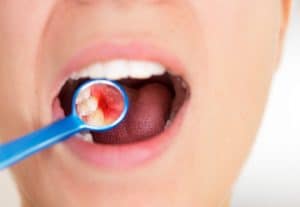 Your gums are the soft periodontal tissues that cover your dental ridges and help protect the roots of your teeth. They also play an important role in your smile’s appearance, which is why paying close attention to them could help you detect when something is wrong with your periodontal health. For example, patients in Encinitas/San Diego who exhibit signs of gum recession, or the separation of periodontal tissues from teeth, are often at risk of experiencing severe periodontal disease if they don’t seek treatment in time. Fortunately, expert treatment can help you address gum recession and allow the tissues to heal to protect your long-term periodontal health.
Your gums are the soft periodontal tissues that cover your dental ridges and help protect the roots of your teeth. They also play an important role in your smile’s appearance, which is why paying close attention to them could help you detect when something is wrong with your periodontal health. For example, patients in Encinitas/San Diego who exhibit signs of gum recession, or the separation of periodontal tissues from teeth, are often at risk of experiencing severe periodontal disease if they don’t seek treatment in time. Fortunately, expert treatment can help you address gum recession and allow the tissues to heal to protect your long-term periodontal health.
What Gum Recession Could Mean
Gingivitis (early gum disease)
Gingivitis is the first stage of periodontal disease, and it develops from oral bacteria working their way underneath your gum tissues. These harmful microbes release toxic substances that irritate your gums, causing them to separate from your teeth. As they do so, your gums develop pockets where even more bacteria can accumulate, causing your periodontal disease to advance even more rapidly.
Excessive pressure (brushing, flossing, or bruxism)
Your gum tissues are highly resilient when healthy, but over time, repeated trauma such as excessive pressure can cause them to gradually recede from your teeth. Such pressure can result from brushing and flossing your teeth too harshly, which can force your teeth to recede. Or, it can be caused by bruxism – constant teeth-grinding – which pressures your teeth and can agitate the gum tissues around them.
Improper tooth alignment (an uneven gum line)
If your teeth aren’t aligned properly, then the gums around them will be uneven, as well, and you’ll be more likely to have periodontal pockets that make keeping your smile healthy more difficult. The visible effects of crooked teeth may be more noticeable than the gum recession at first, but correcting your smile may require addressing the recession after you’ve straightened your crooked teeth.
Protect Your Smile from Periodontal Troubles
Gum recession can be an important sign of gum disease, or at least a significantly increased risk of it. Fortunately, you can still protect your smile with expert periodontal treatment and maintenance that promotes the healing and reattachment of your gum tissues. For more information, schedule a consultation with Dr. Kania by calling her periodontal office in Encinitas/San Diego, CA, at (760) 642-0711.



